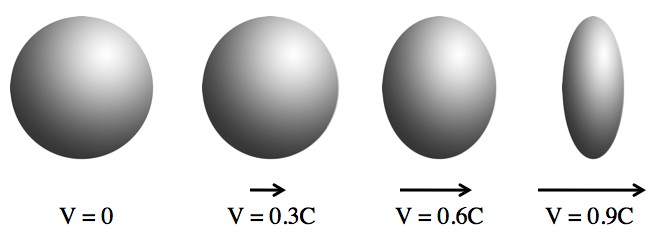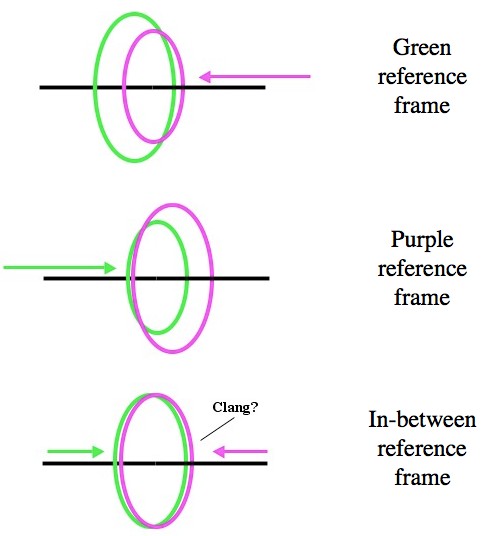Physicist: A lot of things get messed up by relativity, like when and where stuff happens, how massive things are, or how time passes. Length contraction is an effect that literally makes things shorter in the direction of motion. So if something whipped by you from left to right it would be thinner, but just as tall.

"Lorentz contraction" or "length contraction": Moving objects are shorter in the direction of motion. As with all relativistic effects, this mostly shows up close to the speed of light, C. It is physically real, and not an illusion or trick-of-the-light.
Which begs the question, why is it just as tall? Why doesn’t it just shrink all over, or something?
Well, one of the things that relativity doesn’t change is whether or not an “event” actually happens. So imagine this: you’ve got two hoops spanned by paper, and they’re flying at each other face-on. If the paper in a hoop is torn out, then you’ve got an event that everyone will agree on. No matter where you are or how fast you’re moving, you’ll see that the paper was torn. The only thing relativity affects is when and where that event takes place.
So, pretend that length contraction now shrinks things in every direction.

If you assume that length contraction acts perpendicular to the direction of motion you end up with people explicitly disagreeing over events, in a paradoxical kind of way.
If you’re in the reference frame of the green hoop (from your point of view the green hoop is sitting still), then the purple hoop will be smaller and will pass through. The green hoop’s paper will burst, and the purple’s will stay intact. If you’re in the purple hoop’s frame, exactly the opposite happens. And finally, if you’re exactly in between the two frames (you see each hoop approaching at the same speed), both hoops shrink by the same amount and run into each other.
What should be a single event, viewed from different perspectives, is now three different and contradictory events. You can make the effectively identical arguments for enlarging in the perpendicular direction, and even rotation.
Perpendicular special relativistic effects lead to basic contradictions and paradoxes.







Pingback: Q: Why does relativistic length contraction (Lorentz contraction) happen? « Ask a Mathematician / Ask a Physicist
Pingback: Q: How do velocities add? If I’m riding a beam of light and I throw a ball, why doesn’t the ball go faster than light? | Ask a Mathematician / Ask a Physicist
Pingback: Quora
Pingback: Q: How do you prove that the spacetime interval is always the same? | Ask a Mathematician / Ask a Physicist
Pingback: Is Earth Actually Flat? | Youtubers.watch
Pingback: Is Earth Actually Flat? | Woowix
Pingback: Is Earth Actually Flat? | www.vcliper.com
Pingback: Is Earth Actually Flat? science video - Life Sciences Discovery - All Sciences Discovered
Pingback: Is Earth Truly Flat? — Follow, Index, Nofollow & Noindex
Pingback: 5 Trippy Implications About Time ~ Fractal Enlightenment
Pingback: Historia Szczególnej Teorii Względności – część pierwsza – AstroNET – Polski Portal Astronomiczny